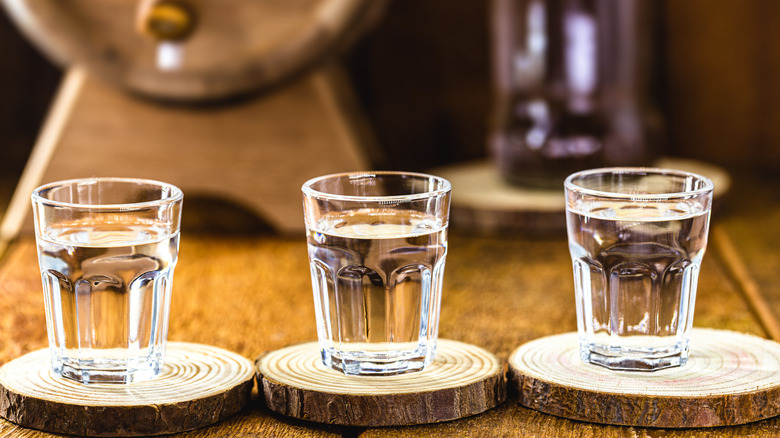What Does It Mean When Vodka Is Barrel-Aged?
It can be a little intimidating to walk into a liquor store if you don't know exactly what you're looking for, having to search through high shelves of bottles with their labels covered in jargon. You've almost certainly heard of spirits being "barrel-aged," but you may not know exactly what that means.
This one is pretty much how it sounds: After the distillation process, a newly-made spirit is stored in wooden barrels for a number of years, during which the spirit's flavors develop and the wood itself imparts different notes. And while barrel-aging is standard for whiskey, it's much less common to come across a barrel-aged vodka — though not unheard of.
That's in large part because the qualities drinkers and distillers look for in whiskey aren't as desirable in vodka. Aging can smooth out the ethanol burn found in any alcoholic spirit, but it also introduces complexity, layering sweet, smoky, and spicy flavors over the base spirit. But purity, not complexity, is considered by many to be the hallmark of a good vodka. Because of that, and the fact that barrel-aging requires years of aging and ample storage space that a spirit otherwise wouldn't need, most vodka distillers aren't messing around with barrels at all. There are, however, exceptions to that rule.
The letter of the law
Some spirits, like bourbon, rye, and Scotch whiskey, are actually required by government regulatory bodies and trade associations to be aged for a set period of time. Vodka, however, isn't one of them. Since it doesn't have to be aged, and many folks don't particularly like age-related characteristics in their vodka anyway, most of it just simply isn't.
In fact, aged vodka falls into an ambiguous category in the eyes of the law. Aging vodka isn't expressly verboten, but the Alcohol and Tobacco Trade Bureau defines vodka as having no "distinctive character, aroma, taste or color" — all of which are properties that can result from aging. (Interestingly, it doesn't limit what products vodka can be made from, though most vodkas have a base of grain or potatoes.) For that reason, you might see vodka makers avoiding the phrase "barrel-aged" and instead describing their spirit as having been "rested on oak" or "finished in barrels." But ultimately, it means the same thing: The distilled spirit spent a significant amount of time in contact with barrels or wood chips, infusing the vodka with the wood's unique flavors.
Na dzrowie to barrel-aged vodka
But aged vodkas certainly exist, and like with any other aged spirit, wine, or beer, careful consideration goes into the kind of barrels used. Oak is a common kind of wood used for aging vodka and other beverages, but there's variation even within that category — French vs. American oak, for instance. Spirit makers may also use other kinds of wood entirely, like chestnut or cherry. Whatever kind of wood is chosen, it also needs to be toasted in order to bend it into a barrel shape, and the degree and method of toasting can introduce different flavors as well. Sometimes barrels are reused to impart some of the taste of whatever the barrel previously held — hence you'll sometimes find vodka aged in cognac, wine, or even whiskey barrels.
Because aged or "barrel-finished" vodka is still a relatively niche, experimental product, you won't find it everywhere, and when you do, it's likely to be a bit pricier than most standard, unadulterated vodka options. If you're itching to try some bold flavored vodkas but aren't having any luck at your local shops, you can always tide yourself over with some homemade vodka infusions to really level up your next at-home cocktail hour.


